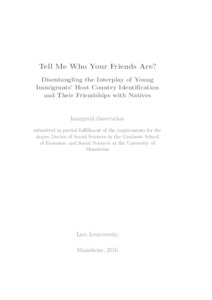|
Tell me who your friends are? Disentangling the interplay of young immigrants' host country identification and their friendships with natives
Leszczensky, Lars
![[img]](https://madoc.bib.uni-mannheim.de/40937/1.hassmallThumbnailVersion/Leszczensky-2016_dissertation.pdf)  Vorschau |
|
PDF
Leszczensky-2016_dissertation.pdf
- Veröffentlichte Version
Download (1MB)
|
|
URL:
|
https://madoc.bib.uni-mannheim.de/40937
|
|
URN:
|
urn:nbn:de:bsz:180-madoc-409370
|
|
Dokumenttyp:
|
Dissertation
|
|
Erscheinungsjahr:
|
2016
|
|
Ort der Veröffentlichung:
|
Mannheim
|
|
Hochschule:
|
Universität Mannheim
|
|
Gutachter:
|
Kalter, Frank
|
|
Datum der mündl. Prüfung:
|
6 Juni 2016
|
|
Sprache der Veröffentlichung:
|
Englisch
|
|
Einrichtung:
|
Außerfakultäre Einrichtungen > GESS - CDSS (SOWI)
Fakultät für Sozialwissenschaften > Allgemeine Soziologie (Kalter 2009-)
|
|
Fachgebiet:
|
300 Sozialwissenschaften, Soziologie, Anthropologie
|
|
Normierte Schlagwörter (SWD):
|
Immigration , Integration , Freundschaft , Identifikation
|
|
Freie Schlagwörter (Englisch):
|
Immigration , Integration , Friendship , Identification
|
|
Abstract:
|
The stronger young immigrants identify with the host country, the more native friends they have–and vice versa. While this association between emotional and social integration has been well established by cross-sectional studies, little is known about how and why it emerges. Do immigrants select their friends based on their national identification? Or does having native friends influence immigrants’ identification with the host country? This cumulative dissertation offers four longitudinal studies in order to answer these overarching questions and respective follow-up questions.
In the first study, four broad theoretical scenarios are introduced and longitudinally examined using three-wave panel data for adolescents of Turkish origin in Germany. Lagged first-difference models that account both for stable unobserved heterogeneity and reverse causality reveal that changes in immigrants’ national identification and the share of native friends did not affect one another. This finding cautions researchers to interpret the cross-sectional association between immigrants’ national identification and their friendships with natives in a causal manner.
The second study tries to get closer to the micro-level processes underlying the ambiguous association between friends and identification. For this purpose, two respective selection and influence mechanisms are distinguished and empirically tested with two waves of Dutch social network data. Stochastic actor-oriented models (SAOM) for the co-evolution of networks and behavior show that strong national identification did not make immigrants more likely to befriend native peers. Native students, however, preferred to befriend immigrants with stronger rather than weaker national identification. There was no evidence of any kind of social influence.
The third study suggests that earlier research may have failed to identify social influence mechanisms because these might be conditional on the nature of ethnic boundaries. Related hypotheses are developed and tested for Turkish and ethnic German adolescents, for whom ethnic boundaries are particularly bright and blurred, respectively. Using lagged first-difference models on two three-wave German panel data sets, the results confirm that Turkish students’ national identification was not affected by their native friends. There is some indication, however, that friends did affect the development of ethnic Germans national identification.
The fourth and final study revisits the unexpected findings of the second study. For one thing, the analysis is replicated with newly collected three-wave German network panel data that have various advantages over earlier datasets. For another, a theoretical argument is developed and tested about the role of opportunity structure in the form of relative group size. Using SAOM, it is found that in ethnically highly diverse schools, immigrants with stronger host country identification were more likely to befriend native peers; but there were no respective selection effects for natives. Again, friends did not influence immigrants’ national identification.
In sum, the key conclusion of this dissertation is that the association between immigrants’ friendships with natives and their national identification is mainly a selection story. Depending on relative group size, immigrants’ national identification seems to affect friendship choices of both immigrants and natives. However, except under very specific favorable social conditions, there is little evidence that friends in turn influence immigrants’ national identification.
|
 | Dieser Eintrag ist Teil der Universitätsbibliographie. |
 | Das Dokument wird vom Publikationsserver der Universitätsbibliothek Mannheim bereitgestellt. |
 Suche Autoren in Suche Autoren in
Sie haben einen Fehler gefunden? Teilen Sie uns Ihren Korrekturwunsch bitte hier mit: E-Mail
Actions (login required)
 |
Eintrag anzeigen |
|
|
